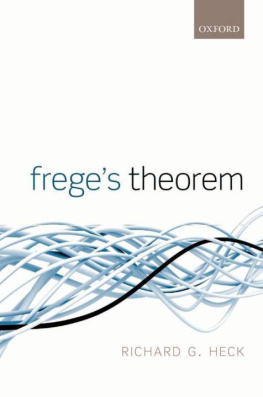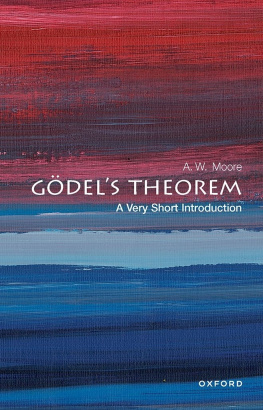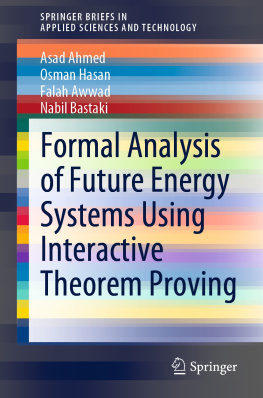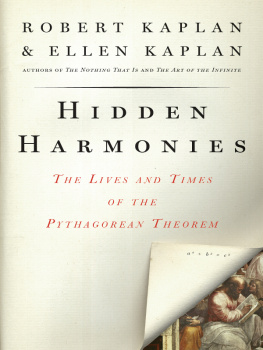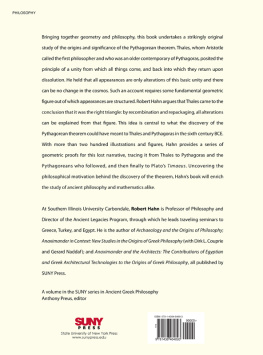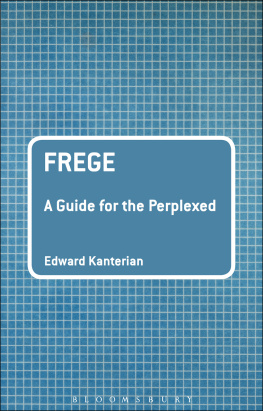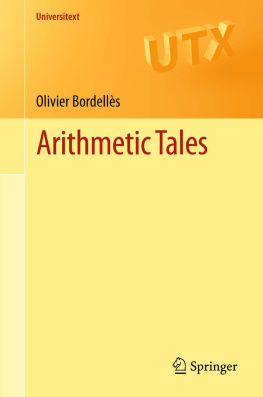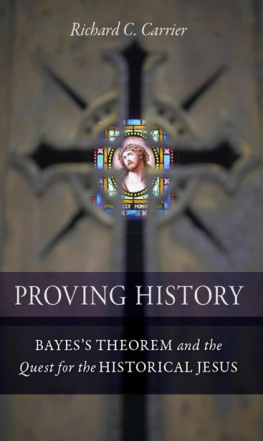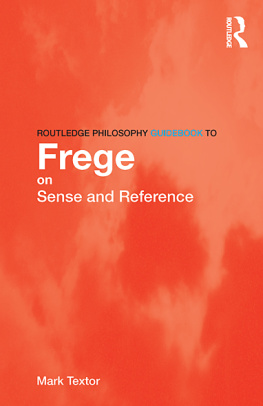Richard G. Heck, Jr



ix
Xi
1 1
This book has been a long time coming. The papers collected here represent the fruits of a two decade investigation of philosophical, historical, and technical questions related to Frege's Theorem. While I continue to think about these questions from time to time, my work on Frege has moved in other directions, and I feel as if I have said most of what I have to say about Frege's philosophy of arithmetic. That makes it a good time to collect these papers. Nonetheless, the process of revising them for publication has renewed my passion for problems I'd almost forgotten losing sleep over. I had a surprsing amount of pure fun writing the overview that appears as Chapter 1, as well as the postscripts that recount changes of mind or respond to published criticisms of my work. Thanks to those who have paid attention to it.
When I re-read these papers at the start of this project, I was surprised by how well they fit together. The earliest of them was drafted before I had my first job; the latest was finished only quite recently. So there are plenty of changes of direction, emphasis, and view. But there are, at the same time, dominant themes that re-appear in different forms in different places, and Chapter 1 is intended to give the reader a sense for what some of these are. The whole, I believe, is certainly greater than the sum of the parts, and that is what makes it worth reprinting the papers together. I hope that even those who have already read them separately will find that reading them together reveals something new.
While working on these topics, I have been privileged to have the support and encouragement of many friends, students, and colleagues, and I have benefitted greatly from their comments and criticisms. So a big thanks to Lawrence Abrams, Andrew Boucher, Sylvain Bromberger, Tyler Burge, John Burgess, Emily Carson, Dick Cartwright, Karin Case, Peter Clark, Roy Cook, Tony Corsentino, Annette Demby, Bill Demopoulos, Mic Detlefsen, Burt Dreben, Philip Ebert, Kate Elgin, Delia Graff Fara, Fernando Ferreira, Janet Folina, Michael Glanzberg, Warren Goldfarb, Alice Graham-Brown, Dave Grishaw-Jones, Steven Gross, Bob Hale, Jim Higginbotham, Chris Hill, David Hunter, Darryl Jung, Jinho Kang, Kathrin Koslicki, Michael Kremer, Thomas Kuhn, Oystein Linnebo, Mary Luti, Josep Macia-Fabrega, Lisa Marino, Mathieu Marion, Robert May, Ute Molitor, Charles Parsons, Paul Pietroski, Carl Posy, Ian Proops, Hilary Putnam, Agustin Rayo, Ofra Rechter, Michael Rescorla, Thomas Ricketts, Gideon Rosen, Marcus Rossberg, Tim Scanlon, Josh Schechter, Richard Schwartz, Sally Sedgwick, Lisa Sereno, Brett Sherman, Stewart Shapiro, Ori Simchen, Alison Simmons, Dan Smith, Gisela Striker, Bob Stalnaker, Zoltan Gendler Szabo, Bill Tait, Jamie Tappenden, Gabriel Uzquiano, Albert Visser, Cathy Wearing, Kai Wehmeier, Carolyn Wilkins, and everyone on the FOM mailing list. (My apologies if I have forgotten anyone who ought to have been included.) Thanks also to Peter Momtchiloff, my editor at Oxford University Press, for his encouragement and help; to my production editor, Daniel Bourner, for all his assistance (and patience); and to my proofreader, Joy Mellor, for hers.
There are four people whose influence is felt on almost every page of this book, and so who deserve special mention.
Sir Michael Dummett was my B. Phil. supervisor at Oxford, and the influence of his teaching and writing is felt not just here but throughout my work. His ability to stitch serious scholarship together with the deepest philosophy and make it all into a seamless whole was my original inspiration for becoming a philosopher, and it is something I have tried very hard to emulate.
Jason Stanley is that person to whom I can talk about anything, including some stupid idea I had in the shower that morning. His insight has been invaluable, but his enthusiasm for my work has been even more important. Jason has often carried me through those tough stretches when it has seemed as if everything I thought I knew was false.
Without the contributions of Crispin Wright, this book would never have been conceived, let alone written. His name appears more than any other in this book, except Frege's. I am honored now to call Crispin a friend. It will be clear that we have not always agreed, but he has been a reliable supporter of me and my work since we first met by email in 1988. I am quite certain that my career, and therefore my life, would have been far different if not for his presence.
George Boolos was the person who got me working on this stuff in the first place, as is recounted in the overview. Most of the papers collected here were born in conversation with George, and even those that were written after his death were often influenced by imaginary conversations I would have with him. But as well as being my Ph. D. supervisor, my mentor, and my dear friend, George was a father-figure whose concern for me and my work knew no bound. Working on this book has not only reminded me how much I miss him but also how much he is still with me, and that experience has been precious.
Finally, let me thank my cats, Joe, Lily, Snarfy, Junebug, and Grace, as well as Bob and Cosmo, since departed, for their companionship, as well as for their attempts to help with the typing. Thanks to my daughter, Isobel, both for her love and for her curiosity about my work, which is on full display in Chapter 7. Thanks most of all, however, to my wife, Nancy Weil, for her unending support, including appropriate prodding from time to time, and for the life and love that we share. This collection is dedicated to her.
A few words about notation and terminology.
This book is concerned with philosophical, historical, and technical issues concerning a principle I call "HP": the number of Fs is the same as the number of Gs if, and only if, the Fs and Gs can be correlated oneto-one. The principle has gone by a number of names over the years. In Frege's Conception of Numbers as Objects, Crispin Wright calls it "N-", for "numericial equality", or something of the sort, but the name did not stick. In "The Consistency of Frege's Foundations of Arithmetic", George Boolos dubbed it "Hume's principle", on the ground that Frege quotes from Hume when introducing it. But several people have objected that this designation is inappropriate and that something like "Cantor's principle" would have been better, since it was Cantor-not Hume, not Frege-who first realized that equinumerosity could be taken as a standard for the equality of numbers quite generally, and not just for finite sets, as Hume would have supposed. For what it's worth, I find this an unnecessary fuss. Though I never asked him, I very much doubt that Boolos thought Hume had scooped Cantor. The term "Hume's principle" was intended as a proper name, not a definite description, and has no historical implications. Perhaps that would have been clearer had Boolos written "Hume's Principle", as I generally did. But Boolos himself neatly solved this problem. Alluding to Chomsky's use of "LF" (which is not "logical form", in anything like the philosopher's sense), we may simply call the principle "HP".

